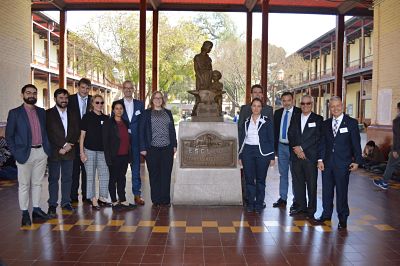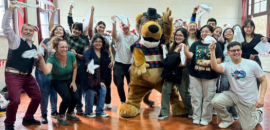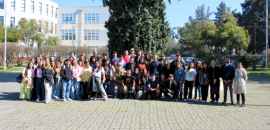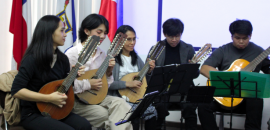You are here
German and Colombian delegation visit USACH to develop a joint project for dual degree programs and international mobility

FH Munster and the Bolivarian Pontifical University of Medellin met with authorities to outline an internationalization action plan for their engineering and business programs. Our rector, Juan Manuel Zolezzi, affirms that, “we are working on the most important areas for the three institutions, focusing on both undergrad and graduate programs, and we hope that our work will be fruitful in the long term.”
The delegation from two prestigious foreign universities from Germany and Colombia met at the University of Santiago to outline the next steps to take in the internationalization project that consists of student mobility, international cooperation, and digitalization of study processes. This plan will be implemented thanks to external financing from the German Academic Exchange Service (DAAD).
During this week, they will make presentations on their universities, programs, guidance and educational projections, and will attend talks organized by the USACH authorities, to learn more about our programs of study in order to identify common points and define the programs in which dual-degree programs may be offered.
“We are working on the most important areas for the three institutions, focusing on both undergrad and graduate programs, and we hope that our work will be fruitful in the long term,” affirms our University’s rector, Dr. Juan Manuel Zolezzi.
For Julio Jairo Ceballos, rector of the Bolivarian Pontifical University of Colombia, "this project means a close academic relationship among the three universities, for the mobility of our students and researchers. We believe we have many things in common, and that is why we want to delve further into the engineering programs.”
Likewise, Vice Rector of Learning and International Relations for FH Munster University of Germany, Frank Dellmann, states that they have already being working continuously with USACH, mainly in the Faculty of Economics, in the “CALA” dual-degree program for Business students, but now they want to strengthen these ties, “this week we want to work together to create dual-degree undergraduate programs at our universities, and for that we are following the example of our existing program.”
He also adds that, “in these new programs, we want to use digital teaching and learning formats, and we want to encourage students who do not participate in exchange programs to access international skills without the need to travel, what we call ‘in-house internationalization,’” he concludes.
News
 International students learn cueca with Usach Without Borders and Department of Cultures and Arts
International students learn cueca with Usach Without Borders and Department of Cultures and Arts
 Rector Vidal to join the Governing Board of UNESCO's International Institute for Higher Education
Rector Vidal to join the Governing Board of UNESCO's International Institute for Higher Education
 Students visited the Ambassador of Morocco to learn about the country's diplomatic work and culture
Students visited the Ambassador of Morocco to learn about the country's diplomatic work and culture



